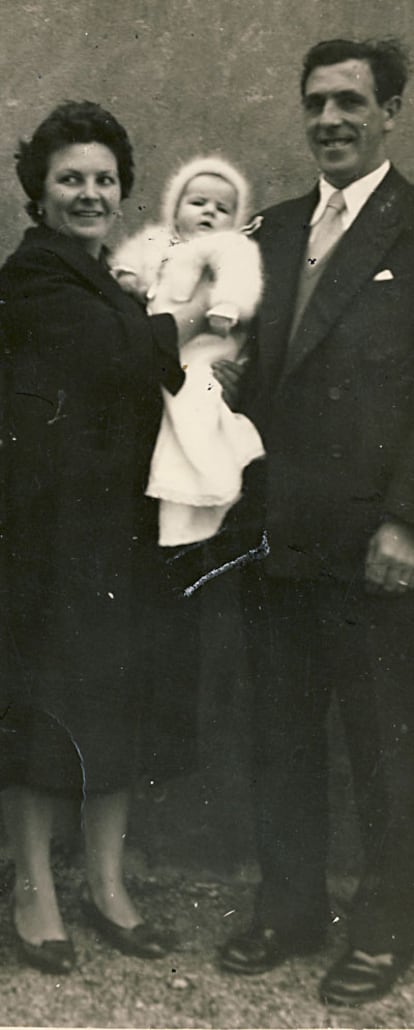Terror victim recognized, 50 years on
No group ever claimed responsibility for bomb attack that killed 22-month old
More than 50 years after she was killed by a bomb aged just 22 months, Begoña Urroz Ibarrola has finally been recognized as the first victim of terrorism since the Spanish Civil War, joining a list of more than 1,000 people, most of them killed by Basque separatist group ETA. Begoña's mother, now aged 80, will receive 250,000 euros in compensation from a government fund.
Begoña died on June 27, 1960 after a bomb placed in a suitcase exploded in the luggage depository of San Sebastián's Amara railway station. The event was largely kept quiet by the regime of General Franco, with newspapers also reporting further explosions on a Barcelona-Madrid mail train, as well as in two villages in the northern towns of Quinto and Pina del Ebro, and in the luggage depositories of stations in Madrid and Barcelona.
These were the first such attacks following the end of the civil war; there would be no further terrorism until eight years later, when ETA murdered a civil guard. No organization has ever claimed responsibility for the attacks that killed Begoña and which injured four other people. Some believe that ETA - which had been formed the year before - was responsible, while others point to a little known anarchist group known as DRIL, the Iberian Liberation Revolutionary Directory, whose members were alleged to have been involved in the unsuccessful hijacking of the Portuguese-flagged Santa Maria cruise ship the following year.
Juan Urroz and his wife Jesusa Ibarrola were never offered compensation. Several years ago they hired a lawyer to pursue the matter, but say that they gave up in the face of red tape. Eventually, the government-run Victims' Support Agency contacted the family, offering them compensation. "They spoke to us and asked my mother for documentation," says Jon Urroz.
Last September, Congress approved new legislation outlining compensation for the victims of terrorism, moving the date back to January 1, 1960, specifically to allow the Urroz family to apply for damages. Until then, a law passed in 1999 set the earliest date for victims of terrorism to apply for compensation as June 7, 1968, when ETA killed Civil Guard José Pardines, considered the group's first victim. The group has killed more than 800 people during its 50-year history, with the latest victim being French police officer Jean-Serge Nerin, who died in a shootout with ETA terrorists on March 16.
ETA has killed soldiers, civil guards, police officers, politicians, judges and hundreds of innocent civilians in a terrorist onslaught that continued despite the advent of democracy in Spain.
The Act aims to honour the victims of terrorism and reflects the "recognition and respect" of the state. "People who demonstrate they have experienced serious threats or direct coercion from terrorist organizations will receive special attention, within the framework of the government", the text reads. It has taken the Urroz family several months of form-filling and interviews to receive compensation.
Last week, José Manuel Rodríguez Uribes, the Director General of the Victims of Terrorism Agency, signed the agreement. The government is not concerned with establishing responsibility for the attack.
"I don't know anything about the Interior Ministry having approved the compensation. I don't think that my mother does either. But I suppose they will contact us," said Jon Urroz on December 8. "The money is not important. We would have preferred our sister not to have died in this way."
The money will be given to Jesusa Ibarrola. Her husband died in 2008. "We don't need the money. I don't know what my mother will do with it. She is very religious, and works with charities. I imagine that she would give part or all of it to Church-related charities," says Jon Urroz.
June 27, the day that Begoña died, has been declared a day of homage to the victims of terrorism. As of last year, Congress holds a special session on this day "to perpetuate the memory of the victims in the collective memory." Speaking that day, King Juan Carlos said the unity of all the parties is obligatory for the sake of the victims. He described unity against terrorism as an obligation for all democrats.

Tu suscripción se está usando en otro dispositivo
¿Quieres añadir otro usuario a tu suscripción?
Si continúas leyendo en este dispositivo, no se podrá leer en el otro.
FlechaTu suscripción se está usando en otro dispositivo y solo puedes acceder a EL PAÍS desde un dispositivo a la vez.
Si quieres compartir tu cuenta, cambia tu suscripción a la modalidad Premium, así podrás añadir otro usuario. Cada uno accederá con su propia cuenta de email, lo que os permitirá personalizar vuestra experiencia en EL PAÍS.
¿Tienes una suscripción de empresa? Accede aquí para contratar más cuentas.
En el caso de no saber quién está usando tu cuenta, te recomendamos cambiar tu contraseña aquí.
Si decides continuar compartiendo tu cuenta, este mensaje se mostrará en tu dispositivo y en el de la otra persona que está usando tu cuenta de forma indefinida, afectando a tu experiencia de lectura. Puedes consultar aquí los términos y condiciones de la suscripción digital.








































